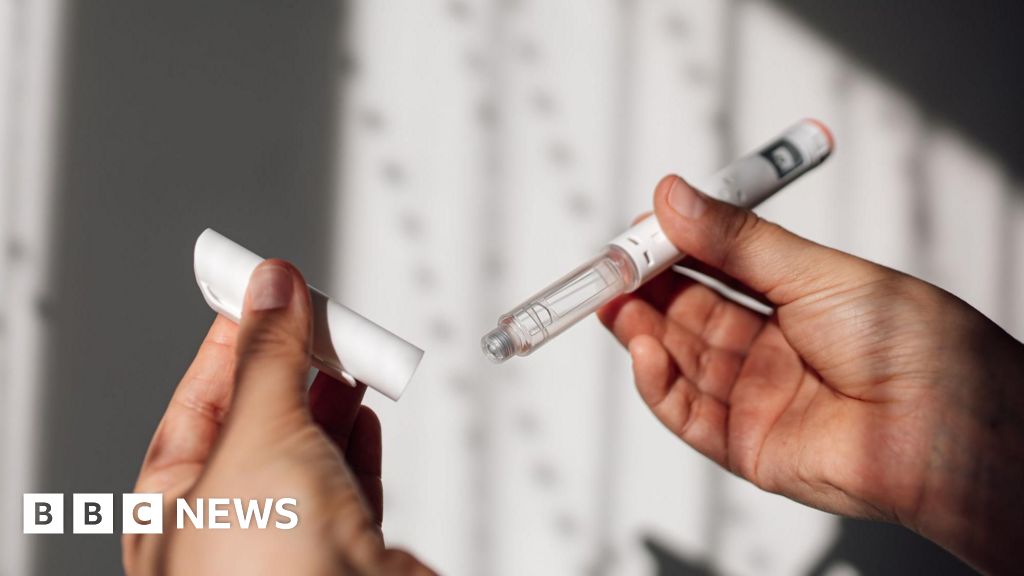A study into potential serious side effects of weight loss jabs has been launched after hundreds of people reported problems with their pancreas. The Medicines and Healthcare Regulatory Agency (MHRA) and Genomics England are asking people on weight loss drugs who have been hospitalised by acute pancreatitis to get in touch. There have been hundreds of reports of acute and chronic pancreatitis from people who have taken drugs such as Mounjaro, Ozempic and Wegovy, although none are confirmed as being caused by the medicines. The aim is to "better predict those most at risk of adverse reactions", said MHRA chief safety officer Dr Alison Cave. The study is being run through the MHRA's Yellow Card scheme, which allows anyone to report an issue with a medicine, vaccine or medical device to help identify safety issues as early as possible. Patients aged 18 and over, with bad reactions to the weight loss jabs - which are also licensed for type 2 diabetes - are being asked to report the detail on theYellow Card website. They will then be asked if they would be willing to take part in the study, which will check whether some people are at a higher genetic risk of acute pancreatitis when taking these medicines. Patients will be asked to submit more information and a saliva sample, with the overall aim of reducing the occurrence of the side effects in future, says the MHRA. Cases recorded on the Yellow Card website up until 13 May this year include 10 in which patients, who were using weight loss drugs, died from the effects of pancreatitis - but it is not clear whether other factors also played a part. It is impossible to know exactly how many people in the UK are on weight loss drugs as many users obtain them online through unregulated sources, rather than through their doctors. Health officials have suggested the jabs could help turn the tide on obesity. However, they have also warned the drugs are not a silver bullet and often come with side effects, commonly including nausea, constipation and diarrhoea. And the MHRA has also warned thatMounjaro could make the oral contraceptive pill less effective for some patients. Dr Alison Cave, the MHRA's chief safety officer said information from the study "will help us to better predict those most at risk of adverse reactions, enabling patients across the UK to receive the safest medicine for them, based on their genetic make-up". She said evidence showed almost a third of side effects to medicines could be prevented with genetic testing. "It is predicted that adverse drug reactions could cost the NHS more than £2.2bn a year in hospital stays alone," she added. Prof Matt Brown, chief scientific officer at Genomics England, said: "GLP-1 medicines like Ozempic and Wegovy have been making headlines, but like all medicines there can be a risk of serious side effects. "We believe there is real potential to minimise these, with many adverse reactions having a genetic cause." He said the next step would be to "generate data and evidence for safer and more effective treatment through more personalised approaches to prescription, supporting a shift towards an increasingly prevention-focused healthcare system".
Weight loss jabs study begins after hundreds report pancreas issues
TruthLens AI Suggested Headline:
"Study Launched on Pancreatic Risks Associated with Weight Loss Injections"
TruthLens AI Summary
A new study has been initiated to investigate the potential serious side effects associated with weight loss injections, following numerous reports of pancreatic issues among users. The Medicines and Healthcare Regulatory Agency (MHRA), in collaboration with Genomics England, is reaching out to individuals who have experienced acute pancreatitis after using weight loss drugs, such as Mounjaro, Ozempic, and Wegovy. While hundreds of cases of both acute and chronic pancreatitis have been reported, it remains unclear if these medications are the direct cause. Dr. Alison Cave, the MHRA's chief safety officer, emphasized that the study aims to better understand which individuals are at an increased risk of adverse reactions. Participants in the study will be recruited through the MHRA's Yellow Card scheme, which allows patients to report any issues they encounter with medications. Those aged 18 and above who have had severe reactions to these weight loss injections are encouraged to submit their experiences on the Yellow Card website and may be invited to provide additional information, including saliva samples, to assist in identifying genetic predispositions to pancreatitis related to these drugs.
As of May 13, data from the Yellow Card website has recorded ten fatalities linked to pancreatitis among users of weight loss medications, although it is uncertain whether these cases were solely attributable to the drugs. The exact number of individuals using weight loss drugs in the UK is unknown, as many obtain them from unregulated sources online rather than through healthcare providers. While health officials advocate for the potential of these injections to combat obesity, they caution that they are not a panacea and can lead to side effects like nausea and constipation. The MHRA has also noted that Mounjaro may affect the efficacy of the oral contraceptive pill for certain users. Dr. Cave stated that insights gained from this research could significantly enhance the prediction of adverse reactions, potentially reducing the NHS's financial burden from drug-related hospitalizations, which is estimated to exceed £2.2 billion annually. Prof. Matt Brown from Genomics England highlighted the importance of personalized medicine approaches to minimize risks associated with GLP-1 medications, indicating a shift towards a more prevention-oriented healthcare system.
TruthLens AI Analysis
You need to be a member to generate the AI analysis for this article.
Log In to Generate AnalysisNot a member yet? Register for free.
